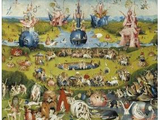Dr. Spitz's review of Hieronymus Bosch's 500th Anniversary
The Noordbrabants Museum in the Netherlands has opened a new exhibition commemorating artist Hieronymous Bosch’s 500th anniversary. Honors College Professor Ellen Handler Spitz wrote a detailed review and analysis of the exhibition in New Republic.
In her article, Spitz gives the reader a glimpse into her lifelong interest in Bosch’s work and grapples with the complexity and ambiguity of his art.
“Like many of my peers, my first exposure to his shape-shifting, spell-binding world came in the form of glossy reproductions, color plates in massive art books,” Spitz wrote. “Our family’s volumes weighted down the bottom shelves of mahogany bookcases in front of which I sprawled poring over details—tiny details that rewarded hours of staring. Painted in sure strokes with small brushes, sometimes not more than a single hair, and brilliant hues, Bosch’s teeming human-scapes exuded an aura of the forbidden to my child’s eye.”
Spitz provides close analysis of several of Bosch’s works, including The Garden of Earthly Delights. She explains that for viewers of Bosch’s art, his work grows more complex on many levels, but she emphasizes the endurance of his legacy.
“Obviously, the impact of works of art alters from age to age, and one wants very much to re-imagine its initial reception, despite the 500 years. What matters at least equally, it seems to me, is the endurance of these visions. Beyond their remoteness and delicacy, which push us toward cognition rather than emotion, there is the aesthetics of Bosch’s painting itself and its heady effect on its viewers. Bosch is less a master of composition than a master of draughtsmanship, color, and light.”
Read the full article “The Impious Delights of Hieronymous Bosch” on the New Republic website.
Image: Hieronymus Bosch – The Garden of Earthly Delights (1503-4) – Central Panel, CC by 2.0.
Posted: April 20, 2016, 9:32 AM
